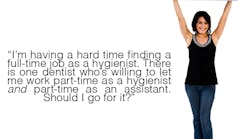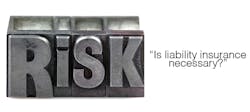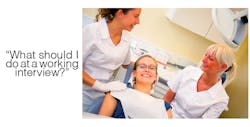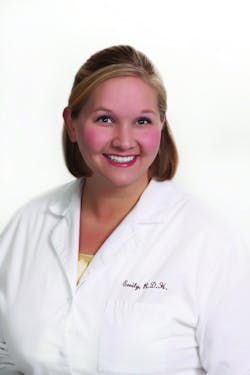Ask Emily: Assisting while employed as a hygienist, liability insurance, working interviews
Dear Emily,
I recently graduated and received my license to practice dental hygiene, but I am having a difficult time finding a job. I found a dentist who needs a part-time hygienist, but said I can assist part-time as well. Do you know anyone who does this? What are your feelings on this idea?
-Heidi
Dear Heidi,
The legal aspects of this topic vary by state. In many states, it is not legal to have dual licensure (or certification) to be a dental assistant and a dental hygienist. If you were to be cited as a violator to your practice act, it would be difficult to determine whether you were acting as an assistant or a hygienist during the time of the violation. Contact your state board for clarification on the legality in your state.
Is becoming an expanded function dental assistant worth it?
That being said, another issue I would have in your scenario would be remuneration. Would you be paid hourly as a hygienist or as an assistant? Would you have to clock in or out based on the tasks you were completing that day? Would you be on salary? In some states there is a legal issue with having one employee with two or more rates of hourly payment.
As far as my own personal employment, I also was a dental assistant prior to being a dental hygienist. In Iowa (where I practice), it is against board policy to be employed as both an assistant and a hygienist. Do I complete tasks such as sterilization, pouring models, and suctioning for the dentist? Absolutely. The grey areas arise with expanded function tasks. It is always my goal to stay within the scope of dental hygiene practice. Keeping that thought process helps me walk the grey line.
Dear Emily,
As a new graduate, I was wondering what your thoughts were on liability insurance? Is it necessary? Should my employer pay for my insurance, or is it my responsibility? Where do you go to find a reputable company?
-Ellen
5 tips for dental hygienists to manage personal liability risks in today's job market
Dear Ellen,
Liability insurance is a necessity as a health professional – accidents happen. You could consider negotiating liability insurance as part of your benefits package, keeping in mind that if your employer chooses to include you on the company insurance policy, your name should appear in print. Retain a copy of this document for your records. (Hopefully, you’ll never need it!)
Finding a reputable liability insurance company can be simple. If you are a member of your professional association, rates can be easily obtained through their website link. Insurance is more reasonable than one might think; I know I was pleasantly surprised at the affordability of insurance in comparison to the payout if something were to happen.
Protect your license and your reputation by planning in advance for the worst.
Dear Emily,
After meeting the doctor and office manager at my initial interview, I was recently asked back for a working interview. Are working interviews common? Should I ask to get paid for the interview? What do I take with me?
-Sandra
Hi Sandra,
A working interview is a great opportunity! I wish all offices would offer this to applicants before formally hiring an individual. A working interview provides the hygienist with a chance to see the daily ins and outs of the office in action prior to agreeing to join the team.
An hourly rate of pay is generally customary for a working interview. Some offices also may prefer to pay by the day in this situation. I am a firm believer that time is precious, so asking for compensation is not out of line.
I would take any instruments you feel would make you perform at your highest level: your loupes and headlight (if you own some), and your scrubs. I encourage you to carry your scrubs on a hanger since some offices do not allow team members to wear scrubs out of the office.
A good way to address any questions in advance is to be open and honest. Call the office back, confirming the day and time of your working interview. Ask any necessary questions in advance. Lastly, arrive at least ten minutes early to do some positive self-talk in the car before you begin your day. Walk into the office with a smile and full of confidence.
---
Resident hygiene expert Emily Boge answers your toughest questions on professional relationships with instructors, employers, and patients, what to use and know in the clinical setting, and how to successfully make the transition from student to professional. Send your questions to [email protected], and you may see it in next month’s column!
More "Ask Emily" columns:
Ask Emily: Dental implants, patient confirmation, and alternative cavity detection
Ask Emily: Nose rings, scheduling from the chair, and working with sensitive patients
Ask Emily: How to get along with instructors and what you should know about ordering instruments for your first operatory









